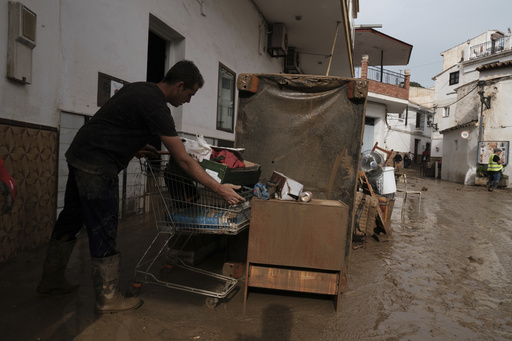
MADRID — The regional leader of Valencia is under intense scrutiny following the devastating floods that struck on October 29, resulting in the loss of over 220 lives. Despite mounting pressure for his resignation, Carlos Mazón, affiliated with the conservative Popular Party, publicly addressed lawmakers, admitting shortcomings in the official response to the disaster, yet reaffirming his decision to remain in office.
The catastrophic storms unleashed wave-like devastation across eastern and central parts of Spain, leaving numerous homes demolished and towns deeply submerged in mud. Speaking during a session with regional lawmakers, Mazón acknowledged that “failings” occurred in the response efforts, particularly highlighting flaws within the regional detection and warning systems.
These comments come after a significant public outcry, as tens of thousands protested in Valencia, demanding his resignation just days earlier. Many residents were frustrated with the delayed emergency alerts that failed to reach cell phones promptly, even after Spain’s national meteorological agency had issued a high-level warning by 7:30 a.m. on the day of the calamity.
The initial response from both regional and national authorities faced widespread disapproval, particularly among residents in the hardest-hit areas like Paiporta. During a visit from Prime Minister Pedro Sánchez, King Felipe VI, and Mazón, survivors expressed their anger by throwing mud at the leaders, further illustrating the community’s dissatisfaction.
Mazón’s authority suffered additional blows when local reports surfaced about a three-hour lunch he had with a journalist while the storm was causing significant flooding in various towns. In his address on Friday, he reiterated claims that the national agency responsible for river flow monitoring had not issued sufficient warnings, claiming the scale of the rainfall was unforeseen.
“It is valid to question whether the emergency system performed as expected,” Mazón said, indicating that it indeed did not fulfill its intended purpose. Under Spain’s decentralized governance, it is the responsibility of regional authorities to manage civil protection and emergency responses, with regional governments permitted to seek additional resources from the national government in Madrid, which is currently led by the Socialist Party.
In response to Mazón’s comments, science minister Diana Morant, a member of the Socialist party, labeled his statements as “an act of political cowardice” and called for the Popular Party to remove him from his position.
Most of those who perished in the floods were elderly, with official statistics revealing that nearly half of the victims were aged 70 and older, underscoring the tragic impact this disaster has had on vulnerable communities in the region.
